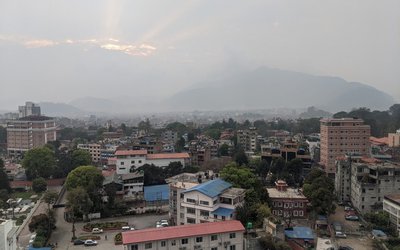
As former carrier diplomat Dr. Singha Bahadur Basnyat, who served as an ambassador of Nepal to United Kingdom, played violin at a small gathering of music lovers with tunes dedicated to Jureli and Rajamati, a Newari folklore depicting the beauty of a lady, cultural expert and historian Satya Mohan Joshi, 95, could not stop his temptation.
Moments after the completion of a couple of song by Dr. Basnyat, Satyamohanji, a follower of Jureli, enthusiastically sought permission to sing the song. There was a reason for Satyamohanji to be jubilant as he himself is from the Newar community of Patan where he played, sang and danced with the Rajamati and encountered the rural folks singing songs of Jureli in his young days.
Former ambassador Dr. Singha Bahadur Basnyat, chairman of Yeti Travels and Binayak Shah, managing director of Summit Residency Airport Hotel, were part of this exclusive program of Music, Poetry and Nepali Cuisine.
Not only 95-year old Joshi, all the persons attending the night enjoyed the play by Dr. Basnyat, on violin with perfect Newari tunes. His voice and chords with Rajamati in old Newari fashion was extremely good. Born in Dillibazar Kathmandu, renowned national athlete Dr. Basnyat’s memory is still fresh as his mind is still hounded by Rajamati, a popular folklore of narrow streets of old and new Kathmandu.
Tempted with the voices and the words of Jureli and Rajamati, legendary figure Satyamohan Joshi also joined the night singing the song depicting the life of Jureli.
British Ambassador to Nepal Andrew James Sparkes was another guest in the program playing the violin. He lured the attention of the crowd with perfect sound and rhythm.
As the evening passed on with music composed by Dr. Bibek Basnyat, Anil Shahi and Surendra Shrestha (Tabala), Pratima Pande and Sangita Thapa also joined with a song. Similarly, Dr. Buddha Basnyat recited a poem.
Passed on by Joshi, Dr. Basnyat has been making Jureli common and popular among a class of people presenting it to the mountains of Nagarjun, Shivapuri Toplang. Finally, Dr. Basnyat played in front of its propounder Joshi at Summit Residency Airport Hotel.
The credit to bring Dr. Basnyat in the public goes to then ambassador of Israel to Nepal Hanan Godder, who supported Jureli as a symbolic idea of going from its nest to mountains and Himalayas, religious shrines and plains of Nepal.
“The bird is my philosophy of life. When I was posted in a remote village of Lalitpur district in my early age, I heard the voices of Jureli and I started to compose the song. It is now this lyric. I am very happy to see enlargement of Jureli by Dr. Basnyat,” said Joshi.
Endowed with great talent in singing and violin, Dr. Basnyat's voice and his passion to play violin continue to attract people. Singing Rajamati in its natural local flavor maintaining complete harmony with music, Dr. Basnyat showed his inner love to music.
“I am greatful to Dr. Basnyat for championing the voice of Jureli from a small room of my home to bigger crowd. I really appreciate the way Basnyat enlarged the stanza of original Jureli, an epic like piece,” said Joshi. “ I feel very honored from Dr. Basnyat. His composition makes Jureli bird more national than when I learnt it in small rural circumstances.”
The atmosphere created at the Music Poetry and Nepalese Cuisine was perfect. Thanks to Managing Director of Summit Residency Airport Hotel and his staffs, Nepali cuisine offered along with other drinks was perfectly matching.
Although the group was small, it was a diverse too: diplomats, prominent hoteliers, persons of business community, high government officials and people representing various walks of life.
Here is what Dr. Basnyat says of his Jureli.
Why do you choose the Jureli bird?
Poor Nepalese villagers from ancient times pondered about Jureli thus: what food Jureli might have eaten, what clothes she might have worn. Human beings have been expressing their own hardships through the medium of the bird. As an urban guy, I expressed a curiosity about the love life of the bird.
Do hearts read the vocabulary of Jureli?
Our vocabulary was different, yet we both started decoding our respective voices. Instead of answering this, Jureli, the light winged nymph of the tree, asked me to fly with her. I am startled. The bird literally wrote most of the text after that. Flying with Jureli in a fast moving flight of imagination, she showed me the habitats and landmarks of our bewitchingly bewildering Nepal. Our journey was complete in ten minutes or so, it fit the lyrics, music and duration of the song. Tour started after Jureli advised me to perform the prayer at Pashupatinath temple first.
What did Jureli answer?
At the end, Jureli answered: yes I am in love with the Nepal which is the land of human nature adorned with varieties of lovely birds (about 840).
Why is Jureli so important?
Surprisingly, when I expressed my late life madness and anger, Jureli consoled me in a spiritual manner highlighting the existential bond between her and human beings thus: Both happiness and hardship are part for achieving salvation. After all, our soul will fly away. Our body will vanish, dust to dust.
How does Jureli come in your imagination?
A sort of bird inspired flight of imagination gripped my mind in January 2013. This happened because in one TV interview around that time, the legendary Nepalese scholar Satyamohan Joshi mentioned about how some villagers in remote areas of Nepal, years and years back, had pondered about the beautiful Nepali Jureli bird in one sentence, preserved in their oral tradition, reflecting their own pain, sorrow and human condition of bondage. I was inspired when Satyamohanji told me that one liner has a deep philosophy. For a while, I expressed profound gratitude to him. I imagine it is the same bird that had serenaded ancient sages, seers, ordinary people, emperor and clowns. That very Jureli delights me with all friendly gestures every morning, every evening, every day in my garden.
How are you spending retirement?
Retired a decade earlier, I was 70 years old in 2013. Yet I was eager to do something creative to keep myself occupied. In that sense, I felt retirement meant I should not have a single day off. Some kind of mental and physical time-out seemed necessary to realize that my brain bulbs are changed occasionally to pursue new ideas.
How did the idea come?
Soon thereafter, while I was pondering about a few lines to further amplify the one liner mentioned by Satyamohanji, I explained to ambassador Hanan about some initial thoughts on Jureli. He seemed delighted with the idea, got the book on the bird, showed me the picture of Jureli and invited me to join his guests for a picnic at Nagarjun top and present the Jureli lyrics and music composition in violin. Accordingly on February 2013, the first draft was presented then. Since then my flight of imagination got me into a dialogue with the Jureli at my garden.
How do you compose the lyrics?
With Hanan’s words, “Nepal is gifted with rich natural beauty”, in the back of my mind, I kept on composing both lyrics and music. A few months later, at the picnic in Shivapuri National Park, at Ambassador Hanan's kind request, I presented the second part of the composition of songs in violin. Finally, at the picnic in Toplang on 15th March 2014, again at ambassador Hanan’s request, I was happy to present the final and finished version. All told, I wish to express deep gratitude to ambassador Hanan. At the same time when I saw the lovely Rhododendron flowers blooming around the top of Toplang area, I was happy to play in violin one Nepali melody popular in good old times: Hera Na Hera Kancha Danda lai Phulley Dhakyo……
- TANAHU HYDROPOWER PROEJCT: A Significant Achievement
- Apr 15, 2024
- AMBASSADOR HANAN GODAR: Sharing Pain With A Nepali Family
- Mar 30, 2024
- VISIT OF KfW AND EIB TO NEPAL : Mission Matters
- Mar 25, 2024
- NEPAL BRITAIN SOCIETY: Pratima Pande's Leadership
- Mar 24, 2024
- NEPAL ARMY DAY: Time To Recall Glory
- Mar 15, 2024
















